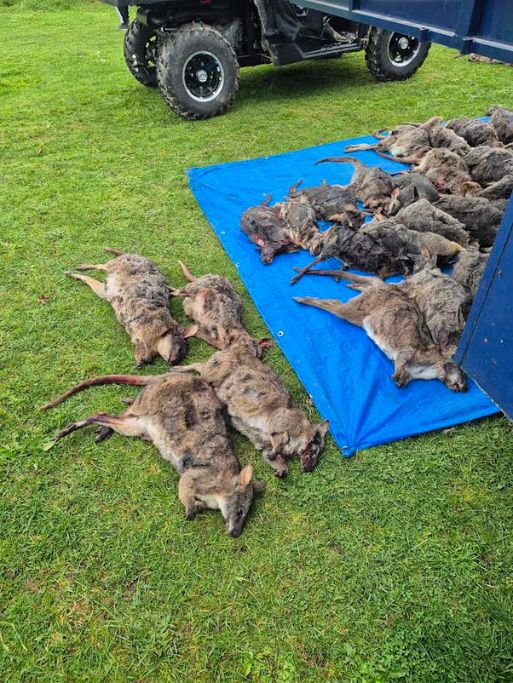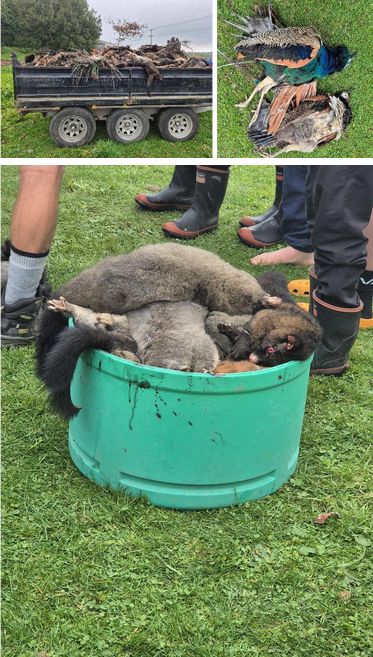Opinion:- Lynley Tulloch
University Lecturer, Early Childhood Education
School possum hunts in Aotearoa New Zealand tend to be polarising.
On the one hand is the school’s touted mission of environmental conservation couched in community values and identity. On the other hand, is the killing of animals within the context of schools and education, which is deeply problematic.
The recent Te Ranga School’s possum and pest hunt is a case in point. Principal Aimee Kennedy described it as “such a big part of our school’s identity and the community loves it.”
This event is a huge fundraiser. It has been framed as conservation and kaitiakitanga (guardianship) by the school. The Friends of Te Ranga School is keenly refocusing on this message building in environmental conservation as an inquiry topic leading up to the event.
This sounds laudable. No doubt children are learning about endemic species, environmental interdependence and ecosystem integrity through this programme.
But what else are they learning? What hidden messages about how other animals (non-native and / or ‘pests’) deserve to be treated are being transmitted to children?
Environment vital
I agree it is vital that children learn about the significance of caring for our environment and develop knowledge and understanding of how to do so. I also think children should be empowered to undertake pro-environmental action. I just don’t think they should be involved in killing animals, or that this is something to be celebrated. I also don’t think that exposing children to masses of dead animals amid a festival atmosphere is healthy. It normalises violence.
And the last thing our world needs today is more violence by humans.
I went to the Te Ranga School possum and pest hunt to see what their environmental refocus looked like. It had all the hallmarks of a regular school possum hunt. There was a gala day attached to it with pony rides and spin the wheel and hoopla jars of lollies. Excited families were enjoying a community day out.
But the gala day was also full of dead animals. After a three day hunting window the dead animals arrived at the school during gala day to be weighed and counted for prize-giving.

Dead Wallabies
Blood splatters
This was not for the faint-hearted. There were blood splattered utes with dead pigs, goats and deer. Dead animals were everywhere. The goats and deer had their throats slit, and they hung limply from utes in a near decapitated state. The decomposing bodies of goats, deer, possums, peacocks, rats, pigs, and wallabies kept coming. The sheer volume, diversity and smell of these dead animals was overwhelming.
Dead possums were piled up high in a trailer while wallabies lay stretched on the ground. The children milling around the animals viewed them with interest. They played around them, picking up peacock feathers and peering down onto the wallabies lying on a tarpaulin. They helped to weigh the possums and watched as dead goats and deer were strung up. This de-sensitises children to the killing of animals.
Jarring
The juxtaposition of a celebratory family day out with so many dead animals is jarring. While some aspects of the Te Ranga School possum hunt had been sanitised – such as a gumboot instead of a dead possum for ‘toss the poss’ – it was still about the killing. The pungent smell of dead animals amid the sausage sizzle and gumboots was nauseating.The use of war language in many possum hunts is disturbing. Everyone thought ‘dead by lead’ was hugely funny. This highlights the attitude of many New Zealanders toward possums and other ‘pests’.
Framing animals such as possums as ‘pests’ relegates them to an unworthy status. This makes them vulnerable to bias and hatred and mistreatment. We need to reframe education and base it on the principles of compassionate conservation and conservation psychology. We can protect native species without having to kill possums and other animals.
We are living in precarious times and are facing a myriad of environmental crises. These include climate change, mass extinction of species and a host of unsustainable practices. The way we educate children about the other animals with whom we share the planet matters. At the heart of reframing environmental education is compassion and empathy. All animals matter.
Possum hunts on the other hand emphasise killing over compassion.
Respect All Animals
Framing animals as ‘pests’ is a way of relegating them into the ‘unworthy basket’. We need to teach our children that all animals are worthy of respect and should be treated compassionately regardless of how they are framed.
There have been other school possum hunts that have erupted in controversy in the recent past. Notably baby possums were drowned at Drury School’s fundraiser hunt by being thrown in a bucket of water.
Violent War
I would argue that celebrating and gamifying the death of animals at school possum hunts is a form of disrespect. Professor Emeritus of ecology and evolutionary biology Marc Bekoff writes the he is “deeply bothered by New Zealand’s incessant and violent war on wildlife”. He suggests that teaching children to kill possums and other animals and to be proud of their achievements is wrongheaded.
Education is about growth and change. Involving children in killing animals may have serious consequences for the development of their empathy. Let’s not hand down outdated and cruel views and attitudes toward animals to our children.
Children need opportunities to immerse themselves in nature in positive and affirming ways. This teaches them to think in a relational way rather than in a compartmentalised fashion. While possums may not belong in Aotearoa, children can be supported in developing an ethic of care and compassion for them, considering their subjectivity.
Let the gala days be about restoring native bush and planting trees, not killing non-native animals.
Footnote: The full article may be seen on Scoop News https://www.scoop.co.nz/stories/HL2406/S00015/school-possum-hunts-have-negative-consequences-for-the-healthy-development-of-empathy-in-children.htm


I just dislike totally these pig and deer hunts which glofify dead animals. Lynley Tulloch’s article is bang on. Teach the children to respect wild animals instead of hate speech and disrespect.
Animals who have been introduced to New Zealand are often described as pests and endure some horrifying treatment at the hands of humans. But just like other animals, these creatures think and feel and should be recognised as sentient . Rabbits, stoats, cats, deer, pigs and goats were all deliberately introduced to New Zealand, and rats and mice were incidental arrivals with new groups of humans.
As a long time deerstalker, I dislike hearing hunters use disrespectful terms, often expletives, with animals they hunt. There needs to be more respect for wild game by hunters. In Europe a deer that has been shot is deeply respected.
One of these traditions is the letzebissen, or last bite, which is practiced in Germany, Austria, Holland, and some Eastern European countries. The animal is placed upon a bed of leaves as a sign of respect, and a sprig of vegetation is placed in its mouth.
Appreciate and admire the animals you hunt.
As for the culture of deer and pig annual hunts, I find them sickening.
And any school that indulges in mass killing, they need to do some serious soul searching.
A very good article by Lynley Tulloch which should wake those schools up. But lets look at where this sick culture arises. As a visiting scientist Dr William Graf said in the 1950s of NZ’s war against deer, it represented an “anti-exotic wild animal phobia” that had no justification. Governments, DOC and extreme green groups have instigated and promoted this sick attitude.